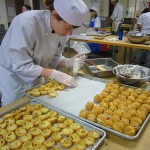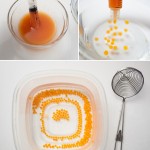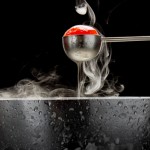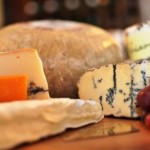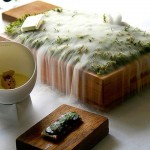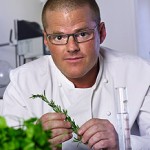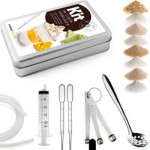If you exclude for a moment chains and other copycat formulaic approaches to food and dining, there are basically two schools hitting the headlines at the moment.
The one grabbing much of the attention, notably in the Michelin and other guides, and indeed the Top 50 restaurants, is the so-called Molecular School of Gastronomy, much favoured by Heston Blumenthal and other chefs whose primary concern is with the science of cooker, the physical and chemical reactions occurring in order to create experimental flavours and textures in dishes that can most definitely not be repeated at home – as a glance at the tasting menu of the Fat Duck restaurant will quickly reveal.
The techniques used by Blumenthal, including the use of dry ice, sous vide (a posh French term for ‘boil in the bag’) and many more can be found here and from other sources. I’ve never eaten at any of Blumenthal’ restaurants, nor indeed any which focus on the molecular level or scientific techniques to tease the customer.
I don’t doubt they produce much innovation and a very spectacular experience, but from my perspective it is the complete antithesis of the type of cooking I would want to see, hear, smell, touch, taste. You learn by experience and trying things out, you use techniques and ideas but just the regular stove and pots, and by buying first rate raw materials. For preference, give me traditional artisan cooking styles and foods cooked with loving care by someone who appreciates food for what it is – much more an art and a craft than a science.
Why? Here are a few reasons among many:
- As a craft, artisan cookery is creative, imaginative, experiential and heavily subjective– a human experience. Using science to create food removes the human element, that which makes food so special, but more to the point in fair to appreciate the fact that food is a very individual experience.
- Far from more processing I would prefer much less. By and large, the simplest ways of getting top quality ingredients from source to plate almost always result in the best dining experiences.
- Traditional techniques, honed over centuries especially in France but also across the continent of Europe, Japan and elsewhere, produce the very best results. They are refined and evolve gradually over a long period of time by passing through many hands, and are the basis in which young chefs are trained.
- I’d question whether the techniques used in molecular gastronomy, often depending as they do on complex and costly equipment, can ever hope to gain any widespread circulation, let alone popularity. Surely they will remain the gimmicky preserve of the wealthy. In other words, this is not a sustainable model.
- A good part of the fun of cuisine should be whether you can recreate dishes at home. When you have the bulk of the equipment and simply need to hone your techniques to achieve good results, that is quite possible.
And that really is the point – I love to cook real food and do it well. I am never going to recreate Blumenthal dishes at home, even with one of those faddy little scientific kits they now flog.
But be assured, no matter how long you practice you will still have better ingredients to source, dishes to learn, refine and blend, recipes and methods to hand down to the next generation, and fun to be had in the kitchen that far surpasses the simple act of eating as fuel. Very rarely do I follow recipes from a book to the letter, since it’s my goal to adapt and personalise a recipe so it pleases me – and many recipes from books certainly don’t need to be followed to the letter. Many can be improved further by careful and sympathetic development.
But then, that’s where learning the tools and techniques, acquiring skills and honing techniques comes into play. When you have all that knowledge and experience under your belt, you can improvise assuredly and with confidence. Most of the recipes on this site come from gradual enhancement over a period of time, through development of an understanding not just of but with the ingredients and the cooking process that goes way beyond the scientific. Almost alchemy, you might say!
Enjoy your cooking!

